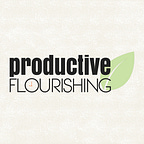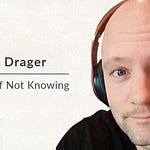Larry Robertson, author of two award-winning books, joins Charlie on the show today to talk about growth, creative edges, play, uncertainty, and how our relationship with our work changes the longer we do it. This episode is a bit of an extension of a post Larry wrote for Productive Flourishing.
Key Takeaways:
[2:12] - What do we do when we come up to a growth edge when we’re out in creative exploration? When the curiosity and wonder stops fueling you, you can get stuck because you’re afraid or don’t know how to move forward. Larry is going to share his three growth-oriented ways to tackle this, and give some examples at different levels.
[3:45] - There is always going to be an edge between what you know, and what you will soon know. What’s interesting about those places is that we’re drawn to them - whether there’s something more we’d like to know, or there’s something more we can do better or do differently. Larry suggests that we may be fearful as we approach these edges because we feel that once we cross over the edge we’ll have to understand everything right away, or we’ll have to take a giant leap into something new. It is okay to make it a habit rather than a solution, as you continue to cross and work toward new edges.
[6:25] - It is important to recognize and understand that we can still push the edge while investing the time to become masterful at something. It’s not an either/or action - these are things you can do simultaneously. Additionally, you can grow your edges outwards to include new fields, or grow your edges deeper into a field you’re already invested in.
[8:45] - Oftentimes we may feel like our environment is putting us in a position that we either have to be in control, or we have to be creative. The irony is that we’re always both; the balance is different for each person, and for each person it’s different at different times. Having “certainty anchors” can ground you to the certain parts of your life as your explore the unknown edges.
[12:30] - How do you approach the edge between the known and unknown, and what do we do once we get there? Some different ideas include starting from your anchor to explore something new, asking questions to figure out how to explore something new or going off the edge, and exploring new territory with those certainty anchors that remind you where you’re headed and why you’re heading there.
[14:28] - Charlie adds a fourth piece: a mindset piece. When we are exploring edges, it’s okay that we don’t know, and we have to be comfortable with not being competent at some points. This gives us the freedom to stumble as we’re moving forward, without worrying about the consequences. Larry talks about “lucky people” and how they approach these edges with a sense of playfulness.
[19:32] - Charlie shares an example in his own life about joining the board at Social Ventures Partners. Many people think they are going to regret the decisions they make or the things they do, but more often than not, people regret the times they could’ve explored the edge and did not. Larry shares the examples of Larry Bird and Magic Johnson and how they used this philosophy during their basketball careers and their pursuits after.
[24:18] - Charlie reflects on his stories since he resigned from the military, and how this has affected his strategic plays - they are more long-term rather than quick, in-the-moment decisions. Once you get to a certain point, most of your adventure is long-term creative and social exploration.
[26:45] - Many of us start in a scenario where we’re “young” - whether that be in age or in our career. Whenever we’re young at something, we tend to see things in a shorter way, so our targets are about the most immediate success we can define. We lack the experience that comes from spending more time in something. Larry relates this to his changing role as a parent as his son gets ready to go to college. How we mature as thinkers and doers changes the game, but it’s a good thing.
[32:15] - In many careers, when you’re new, you’re fueled by the curiosity and passion of doing the process. After you’ve explored the easy wins, there’s a deeper level of mastery to achieve. There’s always going to be the edge of what’s familiar and what’s unfamiliar.
[34:12] - When what we are doing becomes an ongoing excuse, rather than something that fulfills you, it may be an indicator that we have arrived at an edge. In these instances, we must shift forward and look at things in a different way to see how we can expand on it or beyond it. This is when we have to pursue questions to find out what we haven’t yet discovered. This is our “fit sense.”
[36:52] - There are also “depth check” questions we can ask ourselves - are we looking at it too deep or too shallow, or is there somewhere in between that we need to be exploring? There is such a range of questions you can ask, because at the end of the day, it’s about an inquiry mindset that keeps asking.
[39:45] - We can get into a rut where we ask questions that are too deep, based on wrong signals.
[42:00] - In our fields, when we switch mediums or presentation styles we might feel like it’s super hard. On one hand, we crave doing something novel, but on the other hand, we fear not being good at something. However, it’s okay to find out you’re not good at something. We start to think of our total way of doing as our certainty anchor, rather than a few important things to latch on to. All of us get caught in these places where we think we’re being open-minded, when what we really need to do is go a little bit further and be open in a broader sense so we’re not anchored down in a negative way.
[46:33] - The 3 Growth-Oriented Ways to Explore Your Creative Edge: 1) Choice: In everything we do, there is a choice - even within your pre-existing patterns. There is power in this choice. 2) Reaction: When we get results back from making our choice, how do we react to it and why? 3) Improvisation: When we get to the edge, we’re going to have to change the way we do things in some way. If we remember that we have the choice, and that we can consciously react rather than having a knee-jerk reaction, and realize that we will have to improvise, we actually make ourselves more powerful as we move toward new things.
[49:40] - Not choosing is itself a choice. We have a tendency to think that anything different than the status quo is a choice we have to make. But maintaining the status quo is also a choice. We can choose to remain on the comfortable side of control, or we can choose to do something different. Compare the positives and negatives of each choice to the other. When we learn to do that, we see that we’re always at an edge.
[52:45] - These three growth-oriented ways serve as capstone to the whole process of approaching the edge. It is continuous - there is always a new beginning but it’s all part of a cycle. No matter the rewards, it will always involve choice, reaction, and improvisation. Charlie and Larry talk about approaching these choices with a mindset of playfulness.
[57:32] - Larry’s challenge for listeners this week is called: Change the Question! Instead of saying “why?,” say “what?” or “how?” Think about a question that you’re faced with at work or as you move toward an edge - change that question to use a different prompt and see how it gets you thinking differently.
Mentioned in This Episode:
3 Growth-Oriented Ways to Explore Your Creative Edge, by Larry Robertson on Productive Flourishing
Uncertainty, by Jonathan Fields
Stop Lying and Start Creating, by Charlie Gilkey on Productive Flourishing
World Peace and Other 4th-Grade Achievements, by John Hunter












